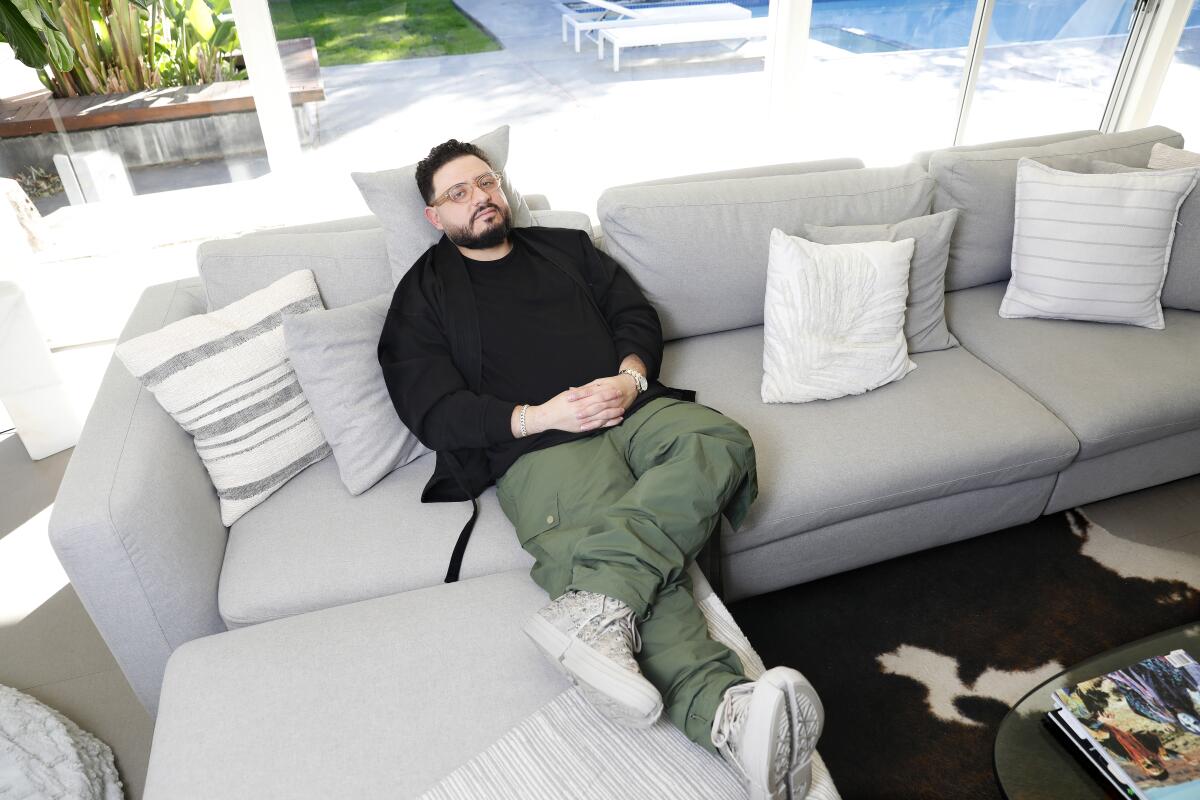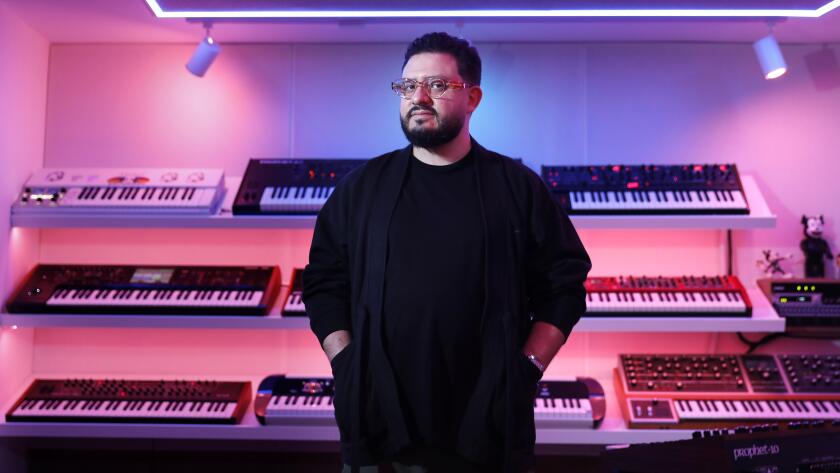For producer Rogét Chahayed, the path to the Grammys included countless piano — and business — lessons
Classical and pop music have more in common than you think — just ask producer Rogét Chahayed. “Classical music is the foundation of all the music we listen to today, when it comes to pop songs, R&B, any style of music, really,” he says.
The 33-year-old Los Angeles native, who is nominated for producer of the year, non-classical, at the 64th Grammy Awards and has worked with Top 40 favorites like Doja Cat, Halsey and Drake, has a unique knowledge of how the two genres overlap. He’s a classically trained pianist, having graduated from the San Francisco Conservatory of Music with a degree in piano performance. During school breaks, however, Chahayed would slip away to L.A., where he circulated in local bands and dipped into studio sessions.
That studio time eventually led to Chahayed meeting Melvin “Mel-Man” Bradford, a renowned producer with Dr. Dre’s Aftermath Entertainment. It wasn’t long before Chahayed was meeting Dre himself. “[Mel] surprised me one day and brought me to Dre’s studio,” Chahayed recalls from his Tarzana home studio, which he converted from a garage. “I wasn’t dressed for it. I wasn’t mentally prepared for it.” As Chahayed walked into the unmarked building, he saw Dre sitting behind a console. “Then he turned around, pointed at me and said, ‘I heard you’re nice on the keys.’”

As a kid growing up in West Hills, Chahayed never saw himself as a concert pianist, let alone a concert-pianist-turned-pop-producer. Born to a culturally blended family — Chahayed’s mother is from Buenos Aires and his father is from Damascus — Chahayed initially gravitated toward sports, skateboarding in particular. But his father had a passion for singing and was eager for his children to learn the piano, hiring a teacher out of the local PennySaver. (Chahayed’s sisters Andrea and Juliana are also musicians.) “I didn’t love it so much at first,” Chahayed admits. “I did it to make my parents happy.”
His parents filled the house with music. “I listened to Arabic music, Latin music, tango, Julio Iglesias, Luther Vandross, Raúl Di Blasio,” he says. “At the same time, I was listening to rap. I was learning about jazz. I was constantly being introduced to new sounds and styles.”
The New Orleans native and “Late Night With Stephen Colbert” bandleader tops all Grammy nominees with 11, spread across a dizzying array of genres.
Chahayed’s agility on the keys and sponge-like facility in sound production earned him a permanent spot as Dre’s go-to keyboard player, a position once held by his childhood idol, producer Scott Storch. “For most of 2014, you could find me at [Dre’s] studio, working, playing keyboards, making beats and basically soaking up all that information that I needed,” he says. Sitting next to a studio wall stacked with keyboards, Chahayed molds his go-to instrument to fit any number of moods. “I can’t play guitar, but I can definitely play on a keyboard and make it sound as if a guitarist was playing,” he says with a laugh.
Today, Chahayed is a highly sought-after collaborator, with Billboard dubbing him “one of hip-hop and pop’s most dependable hit machines.” He’s co-produced and co-written Shelley FKA DRAM’s (formerly DRAM) Grammy-nominated “Broccoli,” Halsey’s “Bad at Love,” Travis Scott’s Grammy-nominated “Sicko Mode” and Drake’s Grammy-nominated “Laugh Now Cry Later.” This year’s producer of the year nomination honors his work on Nas’ LP “King’s Disease II,” Kali Uchis’ album “Sin Miedo (del Amor y Otros Demonios)” and Doja Cat’s Grammy-nominated “Kiss Me More” featuring SZA and its accompanying album “Planet Her.” “We instantly gravitated towards each other’s styles and sounds,” Chahayed says of working with Doja. “She’s an incredible writer-performer. And her focus in the studio is a very rare thing.”

Chahayed’s grounded perspective, penchant for cinematic flourishes and genuine interest in collaboration is what has fueled his success as a producer. “Having the hits helps people know who you are, but they really get to know who you are when they spend time with you in a room,” he says. “I don’t show up to sessions and pull up a bunch of beats. I think that’s something that artists really appreciate. I like to build from the ground up.”
Chahayed’s rise has not been without its speed bumps. In 2013, he and fellow producer-songwriter Wesley Singerman spent a few weeks together “making beats that were next-level,” Chahayed recalls. An area producer took notice and offered to buy the pair’s beats in a cash transaction. “So we were like, ‘This is cool,’” Chahayed says. “We’re making money off music. But the reality was, we were about to get screwed over.”
The next time Chahayed heard his beats, he was listening to Kendrick Lamar’s then-new 2015 album “To Pimp a Butterfly.” Horrified, Chahayed realized his compositions had been placed on two album tracks: the jazzy interlude “For Sale?” and the first half of “u.” Due to the nature of the contract they’d signed, Chahayed and Singerman could not claim credit or royalties. “Instead of burning bridges and getting upset, we decided to keep working hard and take the next step, which was to get a manager,” he says.
In subsequent years, Chahayed has had the chance to meet Lamar, but has opted not to mention his uncredited contributions. “Most of the time artists are unaware of how business is being handled behind the scenes,” he shrugs.
Between his striking voice, A-list collaborators and five Grammy nominations, R&B singer Giveon is poised to transcend genre.
Even when addressing sticky topics such as Travis Scott’s future after the Astroworld tragedy, Chahayed takes a measured, diplomatic tone. “It’s a very unfortunate thing,” he says of the festival at which 10 concertgoers were killed. “There’s only so much that somebody can control when they’re in the middle of a performance. I know that [Scott] doesn’t feel good about what happened. I know he is doing everything in his power to make things right.”
As a performer himself, Chahayed is eager to release solo material and, one day, score films. He’s already on his way; this past year he co-wrote two songs for the “Shang-Chi and the Legend of the Ten Rings” soundtrack: “Lazy Susan” performed by 21 Savage with Rich Brian, Warren Hue and Masiwei, and “Fire in the Sky,” performed by Anderson .Paak.
“He makes me feel comfortable to try different things,” says .Paak of Chahayed. “And his understanding of theory enables him to go places others can’t.”
“As much as I love seeing my name in the credits of a big song, I would love to see my name on the big screen,” says Chahayed. “That’s something that I’m working towards every day. Like David Foster said, go for the EGOT. I want to do it all.”
More to Read
From the Oscars to the Emmys.
Get the Envelope newsletter for exclusive awards season coverage, behind-the-scenes stories from the Envelope podcast and columnist Glenn Whipp’s must-read analysis.
You may occasionally receive promotional content from the Los Angeles Times.













